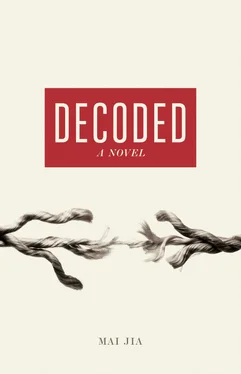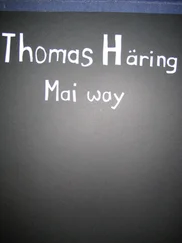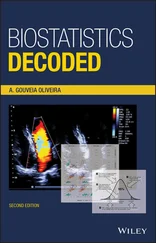Mai Jia - Decoded
Здесь есть возможность читать онлайн «Mai Jia - Decoded» весь текст электронной книги совершенно бесплатно (целиком полную версию без сокращений). В некоторых случаях можно слушать аудио, скачать через торрент в формате fb2 и присутствует краткое содержание. Год выпуска: 2014, Издательство: Allen Lane, Жанр: Современная проза, на английском языке. Описание произведения, (предисловие) а так же отзывы посетителей доступны на портале библиотеки ЛибКат.
- Название:Decoded
- Автор:
- Издательство:Allen Lane
- Жанр:
- Год:2014
- ISBN:нет данных
- Рейтинг книги:3 / 5. Голосов: 1
-
Избранное:Добавить в избранное
- Отзывы:
-
Ваша оценка:
- 60
- 1
- 2
- 3
- 4
- 5
Decoded: краткое содержание, описание и аннотация
Предлагаем к чтению аннотацию, описание, краткое содержание или предисловие (зависит от того, что написал сам автор книги «Decoded»). Если вы не нашли необходимую информацию о книге — напишите в комментариях, мы постараемся отыскать её.
Decoded — читать онлайн бесплатно полную книгу (весь текст) целиком
Ниже представлен текст книги, разбитый по страницам. Система сохранения места последней прочитанной страницы, позволяет с удобством читать онлайн бесплатно книгу «Decoded», без необходимости каждый раз заново искать на чём Вы остановились. Поставьте закладку, и сможете в любой момент перейти на страницу, на которой закончили чтение.
Интервал:
Закладка:
I remember particularly, not long after he had joined the cryptography division I went to Y country to participate in a three-month professional assignment — it was also to do with PURPLE. At that time Y country was also working on decrypting PURPLE and they had got a lot further with it than we had — headquarters decided to send us there specially to see what we could learn. Three people were selected to go, me and one of the cryptographers from my section, plus a deputy division chief from headquarters — the man who oversaw our work on behalf of the central authorities.
When I got back I heard a lot of complaints about Jinzhen from the directors of our division and my co-workers; they said that he wasn’t concentrating on his work, that he wasn’t really getting into the spirit of the thing, that he didn’t make demands of himself, and so on. I was very upset to hear this, of course, because it was I who had brought him here — I was supposed to be bringing back an expert and apparently all I had managed to recruit was a clown. The following evening I went to his rooms to find him. The door was ajar. I knocked and there was no answer, so I went in. There was no one in the main room, so I went through to the bedroom. I could see that he was curled up on the bed fast asleep. I coughed and walked into the bedroom, switching on the light. When it clicked on, I was amazed to discover that the walls were plastered with diagrams. Some were like logarithmic tables, covered with lines twisting and turning across each sheet of paper; others were more like trigonometric tables, and their numbers, written in all the colours of the rainbow, seemed to quiver like soap bubbles caught in a beam of light. The whole room seemed as magical as a castle in the air.
When I looked at the annotations he had made to each of the diagrams, I immediately understood that he had rewritten the History of Cryptography in a more concise form — if it hadn’t been for those notes, I simply wouldn’t have understood what it was all about. The History of Cryptography was this massive fat book — three million Chinese characters — and he had managed to condense it down to these simple annotations using just a few lines of numbers — that really did impress me very much. To be able to look at a body and see the bones beneath the skin, to represent them exactly upon paper — that is the work of a genius. But he didn’t even need the skeleton — he had just taken a single finger bone away! Just think about it: think what it means to be able to recreate the whole living organism if all you have is one finger bone!
The fact is that Rong Jinzhen was a genius — there were many things about him that an ordinary person simply could not understand. He could go for months, maybe as long as a year, without saying a word to anyone — it really didn’t seem to bother him — but when he did finally open his mouth, he would say something that quite possibly was more important than everything you have said in your entire life put together. Whatever he did, it seemed as though he did not care about the process at all, the only thing that mattered was the result. The results of what he did were always perfect — it was amazing! He seemed to have an uncanny ability to get to the crux of the matter, but the way that he went about it was unique, peculiar; something that you would never have thought of in a million years. To put the History of Cryptography up in his own room — who would have thought it? Nobody else behaved like that. Let me make a comparison. If we say that a cipher is like a mountain and that decrypting that cipher is like finding the secret hidden in the mountain, then the first thing that most people would do would be to find a way to climb the mountain and when they got to the top, they would start looking for the secret. He wouldn’t do anything of the kind. He would go and climb a completely different mountain and then when he got to the top, he would fire up a searchlight and start looking for that mountain’s secret using a telescope. He was a very strange person, with truly remarkable gifts.
There can be no doubt that when he decided to move the History of Cryptography into his room in this strange way, he was ensuring that his every move, waking and sleeping, was in some way linked with decryption — you can imagine that each cipher recorded in that book seemed to be breathed into his lungs like oxygen, passing through his blood until it reached his very heart. .
. . The first shock I got was from what I saw. However, I immediately received a second shock from what he said to me.
I asked him why he was wasting his time with history. In my opinion, cryptographers are not historians; for a cryptographer to get involved in the history of the subject is stupidly dangerous. Do you know what he said?
He said, ‘I think all ciphers are like living organisms — because they are alive, there is an invisible connection between the ciphers in use in history and those that we use today; furthermore, all the ciphers developed at the same period in time have an intimate relationship. Whatever the cipher is that we want to decrypt now, the answer may well be hidden in an earlier one.’
‘When people create ciphers,’ I said, ‘they have to eliminate every sign of their history; otherwise when you cracked one message you’d crack them all.’
‘That doesn’t affect my basic contention,’ he said. ‘If you are trying to eliminate history from all your ciphers, that also creates a connection between them.’
That really did open my eyes!
He continued, ‘Changing a cipher can be compared to changing a face — it is shaped by trends in evolution. The difference is that the changes of a human face are always predicated upon the same basis — no matter what you do it is still a face, though you may have changed it to make it even more face-like, even more perfect. The changes that you can introduce to a cipher are completely different — today it is a human face, but tomorrow you can make it change into something else — a horse’s face or a dog’s face, or maybe the face of something else entirely. It has no fixed parameters. But no matter how much you change it, the internal features are simply refined, clarified, advanced, rendered even more perfect — that is an evolutionary development that you cannot escape. It is a given that every effort is made to change the face, but it is also a given that you try and make the internal structure more refined — these two givens create a twin path that goes right to the heart of any new cipher. If you can find those two paths in the forest that is the history of cryptography, then they will help you in decryption.’
While he was explaining this, he was pointing to the columns of figures written up around the room like a hoard of ants. Sometimes his finger moved, sometimes it was still, as if he were gradually working his way through to the very heart of the matter.
To tell you the truth, I was astounded by his idea of the twin paths. I understood immediately that although in principle these two paths had to exist, in actual fact they might well not exist at all. Maybe nobody else realized, but if you treated those paths as strings and pulled on them, the person tugging would in the end find himself garrotted. .
Of course I will explain what I mean. Tell me, what does it feel like when you walk closer and closer to a bonfire?
Exactly. You will feel a hot, burning sensation. After that, you do not dare to get too close; you want to preserve a certain distance, so that you won’t get burned again. The same principles apply when you get close to a person — the influence that a particular person exerts over you depends on their individual attractiveness, character and capacities. I can tell you categorically, regardless of whether you are talking about a person who creates ciphers or a person who decrypts them, cryptographers are the most remarkable people, with really unusual capacities — their minds are like black holes. Any one of them is capable of exerting an enormous influence upon their fellows. When you walk into the forest that is a cipher, it is like walking through a jungle in which there are countless traps — at every step you run the risk of falling into one and not being able to get out again. That is why those who create ciphers (just like those who unlock them) don’t dare think too much about the history of encryption, because each concept, each theory in the history of this field can attract you like a magnet; can destroy you. The minute your attention has been distracted by one of these concepts, you are worthless as a cryptographer, because ciphers cannot have any intrinsic similarity to one another, to prevent them from being cracked too easily. Any similarity would make the two ciphers so much rubbish — ciphers are indeed heartless, mysterious things.
Читать дальшеИнтервал:
Закладка:
Похожие книги на «Decoded»
Представляем Вашему вниманию похожие книги на «Decoded» списком для выбора. Мы отобрали схожую по названию и смыслу литературу в надежде предоставить читателям больше вариантов отыскать новые, интересные, ещё непрочитанные произведения.
Обсуждение, отзывы о книге «Decoded» и просто собственные мнения читателей. Оставьте ваши комментарии, напишите, что Вы думаете о произведении, его смысле или главных героях. Укажите что конкретно понравилось, а что нет, и почему Вы так считаете.












